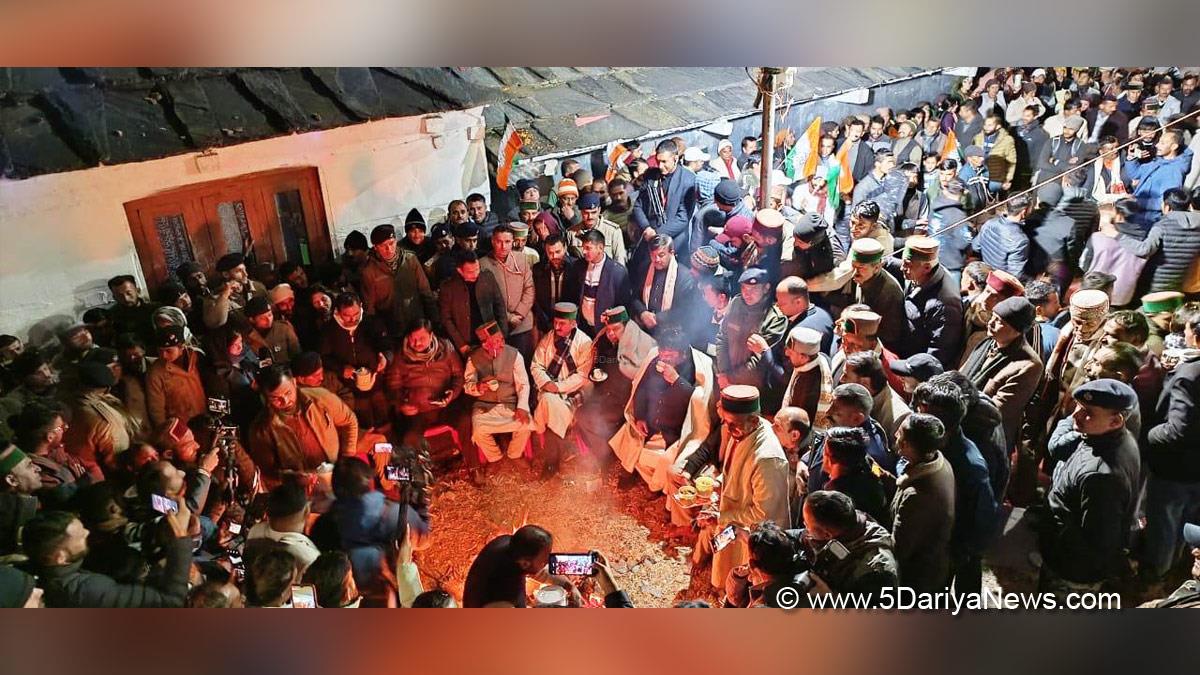Himachal’s march toward self-reliance by empowering its villages: Sukhvinder Singh Sukhu

“The soul of India live in its villages,” and drawing inspiration from this vision of Father of the Nation, Mahatma Gandhi, which underlines the importance of rural strength in nation-building, Chief Minister Thakur Sukhvinder Singh Sukhu has embarked on a mission to empower Himachal Pradesh through its villages placing the rural economy at the heart of the state’s development agenda.
Breaking conventional administrative barriers, the Chief Minister has brought governance directly to the people at Grass root level through the Sarkar Gaon Ke Dwar programme. By staying overnight in remote villages like Tikkar (Kupvi) and Sharchi (Kullu), and now at Baga sarahan in Kullu as well, the remote Dodra Kwar, interacting with locals, mingling with their culture and customs, the Chief Minister has not only built trust but also gained real insight into their everyday challenges.
His humble, people-first approach has left a deep impression on rural communities, marking a new era of participatory governance. In a historic and symbolic gesture, the state-level Himachal Day celebrations were held in the far-flung Tribal Pangi Valley of district Chamba signaling the government’s inclusive development philosophy and resolve to reach every corner of the state.
At the core of the government’s efforts lies a determined push to revitalize the rural economy. Himachal has emerged as a pioneer in promoting natural farming by becoming the first state in the country to declare Minimum Support Prices (MSP) for naturally grown crops. The MSP for maize has been raised from Rs. 30 to Rs. 40 per kg, and for wheat from Rs. 40 to Rs. 60 per kg.
Over 1.98 lakh farmers have already adopted natural farming practices. To support them, the government procured 400 metric tonnes of maize from 1,500 farmers and introduced market brands like Himbhog and Him Makki Atta. Additionally, Pangi has been declared the state’s first natural farming subdivision, underscoring a strong policy commitment to sustainable agriculture.
Dairy farming is also undergoing transformation. Himachal has become the first state in India to fix MSP for milk—raising cow milk prices from Rs.32 to Rs.51 per litre and buffalo milk from Rs.47 to Rs.61 per litre. A transport subsidy of Rs.2 per litre is also being offered to support dairy farmers.
To further boost the sector, the government has launched the Rs.500 crore Himganga Yojana. High-capacity milk processing plants have already started benefiting over 20,000 farmers, and new plants with modern technology are being set up in Dhagwar (Kangra), Kullu, Nahan, Nalagarh, Una, and Hamirpur.
Recognizing the potential beyond apples, the state is promoting the cultivation of diverse fruits through the Rs. 1,292 crore HP SHIVA Project. Currently being implemented across 28 blocks in Bilaspur, Hamirpur, Kangra, Mandi, Sirmaur, Solan, and Una, this initiative aims to bring 6,000 hectares under horticulture.
In 2024–25, the government procured 37,600 metric tonnes of fruit at MSP, giving orchardists assured returns. Facilities like the Rs. 29.22 crore CA Store in Rohru are now operational, and drone services are being planned for safe and efficient transport of perishable produce.
Today, the results of these initiatives are becoming visible. Farmers are receiving better prices, local produce is finding markets, and smiles are returning to rural faces. Whether it’s through natural farming, dairy development, or horticulture expansion, the Chief Minister’s vision of a self-reliant Himachal—rooted in rural prosperity—is steadily turning into reality.
As the fields flourish and rural livelihoods gain strength, Himachal Pradesh is proving that empowered villages are indeed the foundation of a strong and self-sustaining state.

Comments are closed.